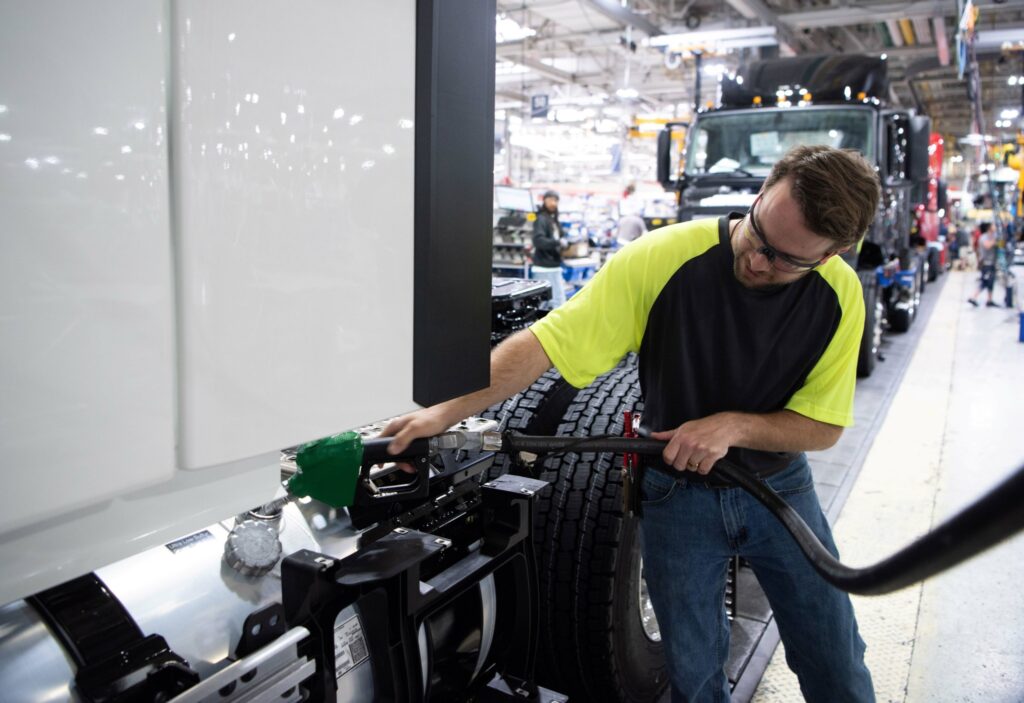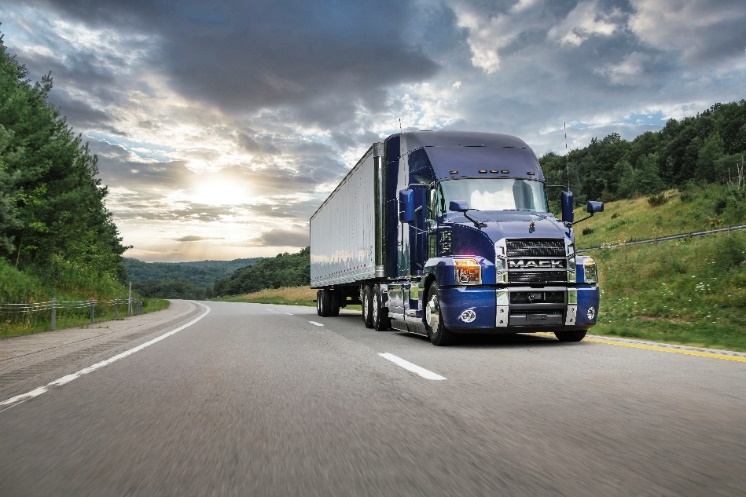Volvo, Mack fueling new trucks with HVO
Volvo Trucks North America has announced an advancement in its sustainability efforts by fueling newly assembled trucks with hydrotreated vegetable oil (HVO), a renewable fuel, as they depart from the Volvo Trucks New River Valley assembly operations (NRV) in Dublin, Virg.
Mack Trucks is also using HVO as fuel to move completed Class 8 vehicles off its production line at Lehigh Valley Operations (LVO), in Macungie, Penn., in a bid to improve sustainability efforts and to reduce reliance on fossil fuels.
All Volvo trucks for the North American market are produced at the NRV plant, including the VNL that will begin production later this summer. This initiative is part of Volvo Trucks’ broader strategy to decarbonize the industry through a three-pillar approach: enhancing internal combustion engine (ICE) efficiency and drop-in renewable fuels to make the largest immediate emissions reductions while continuing to scale the Class 8 Volvo VNR Electric and developing hydrogen fuel cell trucks.

Volvo Trucks is fueling new trucks leaving the NRV plant with 20 to 25 gallons of HVO per tank, with full tanks provided for trucks destined directly to customers. This initiative is expected to replace 1,125,000 gallons of fossil-based diesel annually, achieving an estimated 75% to 85% reduction in CO2 emissions for Volvo Trucks’ operations in North America.
All Mack Class 8 models for North America and export are produced at LVO. It is estimated that by utilizing HVO, LVO was able to reduce carbon emission by about 18%. The Mack MD Series is produced at Roanoke Valley Operations in Salem, Virg., and the facility has plans to begin utilizing HVO this year.
“Today and for the foreseeable future there will not be a one-size fits all approach to decarbonizing transportation,” said Peter Voorhoeve, president, Volvo Trucks North America. “That is why, at Volvo Trucks, we are focused on the three-pillar strategy with battery electric, hydrogen fuel cell and renewable fuels in the internal combustion engine. With the all-new Volvo VNL and by utilizing HVO, we can make the most substantial and immediate impact today. There is a future for the ICE and we’re happy to be doing all factory fills with renewable fuel, an important step towards walking the talk in our sustainability journey.”

“The utilization of HVO will help Mack in its journey to promote the decarbonization of the transportation industry,” said Jonathan Randall, president of Mack Trucks North America. “Whether it’s through the use of HVO, or through the development of Mack battery-electric vehicles, such as the Mack LR Electric refuse and Mack MD Electric models, Mack is committed to reducing its carbon footprint and achieving our sustainability goals.”
HVO is a renewable fuel that can be used in the same engine as fossil-based diesel without requiring engine modifications. Produced from renewable sources such as waste vegetable oils and animal fats, HVO has the same chemical structure as fossil-based diesel so it can be used as a direct replacement to reduce greenhouse gas emissions while maintaining engine performance. By utilizing these waste products as feedstocks, HVO production can promote a more sustainable circular economy by converting waste into fuel.
Unlike first-generation biofuels, these raw sources are processed using a sophisticated hydrotreatment to achieve high levels of purity allowing HVO to be stored, used, pumped, and handled virtually the same way as fossil-based diesel products.
Because HVO is hydrogenated it doesn’t contain oxygen and does not present the challenges of first-generation biofuels, including biodiesel, relating to extreme temperature and storage. This is an added benefit of HVO as it does not require separate storage or fueling infrastructure. HVO, often referred to as renewable diesel, can be used interchangeably with petroleum diesel. Renewable diesel at any blend up to a maximum of 100% (RD100) that conforms to ASTM D975 or EN15940 will not adversely affect engine or aftertreatment performance or durability.
This story has been updated to include Mack Trucks’ HVO usage.
Have your say
This is a moderated forum. Comments will no longer be published unless they are accompanied by a first and last name and a verifiable email address. (Today's Trucking will not publish or share the email address.) Profane language and content deemed to be libelous, racist, or threatening in nature will not be published under any circumstances.